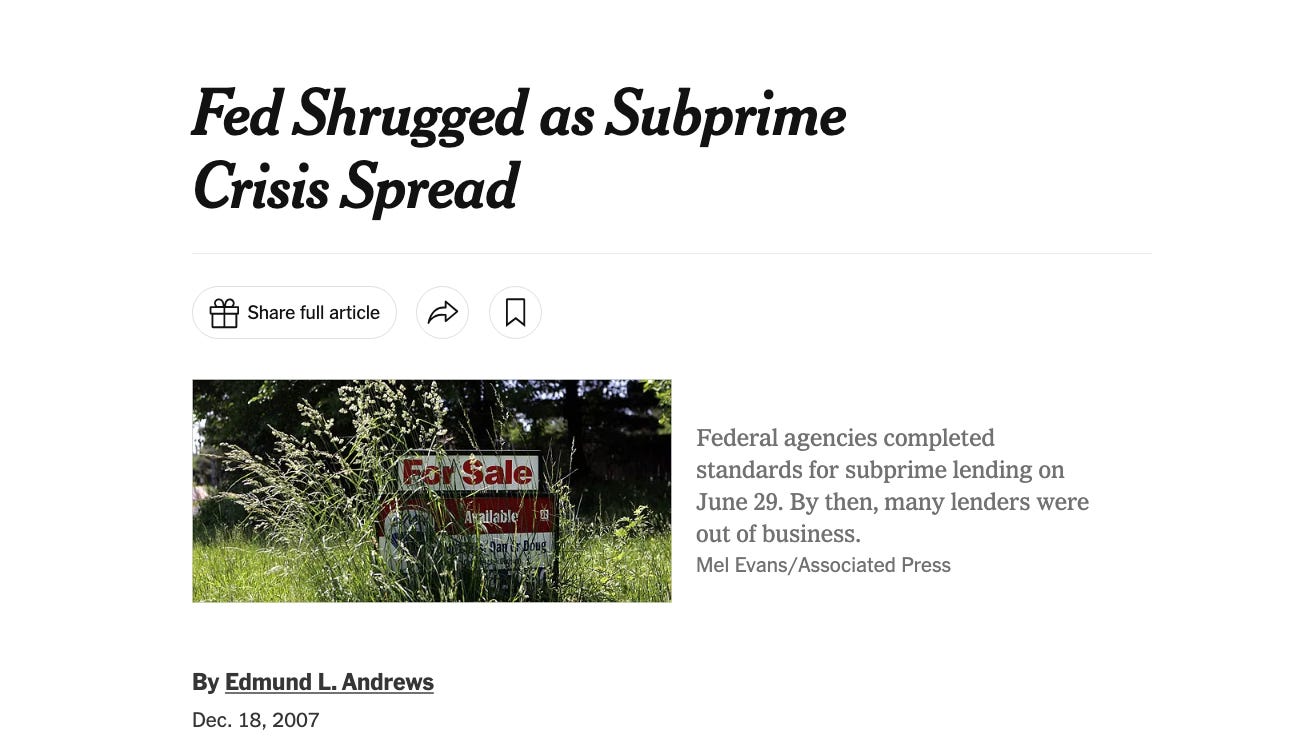You can read Greider's Secrets of the Temple, or (much simpler) read this from Matt Stoller.
Stoller unveils the political motivations behind our central bank's shenanigans... It's really fascinating to know, for one example, that Alan Greenspan was a consultant for Silverado Savings & Loan in addition to being a libertarian acolyte of Ayn Rand.
Excerpt:
But the 2008 financial crisis blew up the Greenspan era, challenging the officials in charge of the Fed in a number of different ways. It was a crisis the Fed should have seen and prevented. The Fed was, after all, the institution that had regulatory authority over mortgages, which it never used. But its leaders were blinded by their obsession with the macro; Ben Bernanke gave a speech titled “The Great Moderation” as the crisis was brewing, in 2004. The blindness was a result of their obsession with macro-economic forces, and ignoring the actual banks and institutions in the real economy. Banks, even big ones, were still micro, left to the losers in the bank supervision department.
And yet, somehow, during the crisis, these banks had affected the real economy. In response, the Fed did what it had done since the Volcker era; it bailed out Wall Street. In this case, it did so by expanding its balance sheet by several trillion dollars, buying bad assets from banks and supplying cash in return. By 2022, its balance sheet had reached $9 trillion. The Fed now regularly loses huge amounts of money due to losses on its portfolio, and those losses are essentially the accounting for a subsidy to Wall Street.
The crisis generated a legitimacy problem for the Fed, since its wizards and oracles had failed, and yet the public had no way to vote them out. But rather than engage in real reform and introspection, like most establishment institutions, the professional managerial economists doubled down. Federal Reserve Independence, rather than a temporary historical phenomenon that should be eliminated as a failed experiment, became sacred, to the point that Joe Biden’s White House had a policy that no administration official could even comment on interest rates.
...
Fed Chair Paul Volcker used to carry around a card of union wage rates, as a reminder that his goal in achieving low inflation was to break union power. The Federal Reserve is responsible in part or fully for the legalization of derivatives, the explosion of subprime lending during
the 2000s, the great financial crisis, a trillion dollar transfer of wealth to big banks as interest rates increased, the institutionalization of crypto-currencies, the merger explosion of the early 2020s, and the failed regulation of Silicon Valley Bank, among other problems. It’s also a highly political institution, pushing free trade and defending large banks; in the 1990s, Fed officials secretly bailed out Mexico so as to protect Citibank and pass NAFTA.
...
here’s more. After the crisis Congress required the Fed to place compensation limits on bank executives. Jay Powell simply refused. The Fed fostered a giant corporate merger wave in 2021, intentionally sabotaged its own payments network, FedNow, because it might be cheaper and better than the system run by large banks, and didn’t block a single merger application of the over 3500 it received from 2006-2021. This choice, as I noted years ago, “includes Silicon Valley Bank in 2021 buying Boston Private Bank and Trust, which the Fed board unanimously justified by noting that SVB would not ‘pose significant risk to the financial system in the event of financial distress.’” Speaking of which, the Federal Reserve’s chief legal officer, Mark Van Der Weide, helped author the legislation that removed regulations on Silicon Valley Bank, and the Fed, and Jay Powell, lobbied for it.
There’s just an endless amount of bad behavior from the technocrats, so the opponents of Trump, asserting that we must protect the “independence of the Fed,” are really missing the point. And I fear that their goal, after Trump leaves office, will be to “restore the independence of the Fed.”
No comments:
Post a Comment
One of the objects if this blog is to elevate civil discourse. Please do your part by presenting arguments rather than attacks or unfounded accusations.